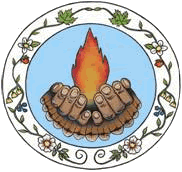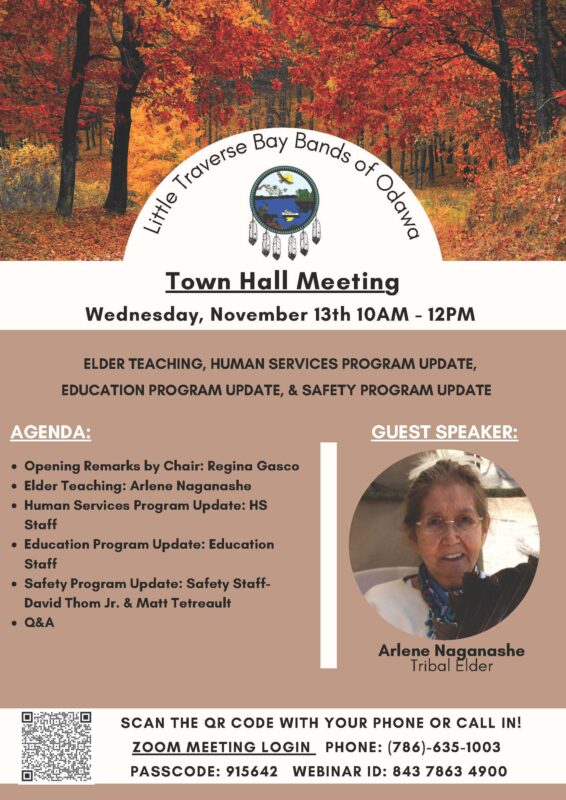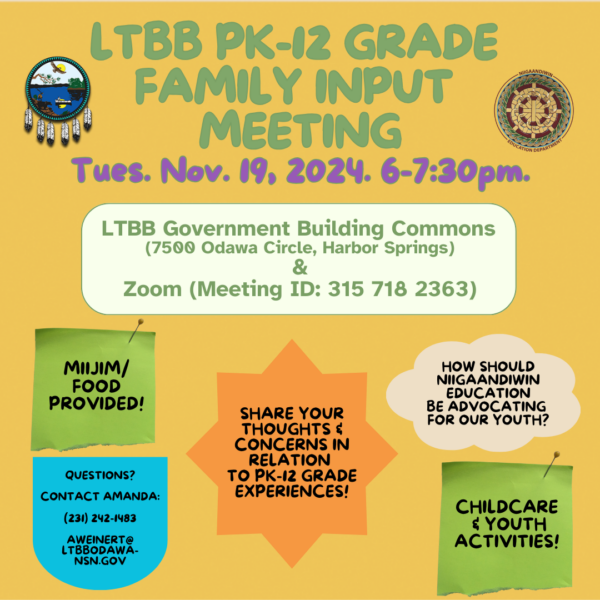General Election: June 28, 2021 Candidates for Tribal Council
RICKY COMPO
TAMARA KIOGIMA
LEROY SHOMIN
DOUG EMERY
WILLIAM ORTIZ
MARCI REYES
KENNETH DEWEY
AARON OTTO
SHARON SIERZPUTOWSKI
SIERRA BODA (WITHDREW 5-14-21)


Tribal Court of the Little Traverse Bay Bands of Odawa Indians has developed an alternative to the typical “Anglo” judicial process. In the beginning, this alternative process is available for juvenile cases such as truancy, curfew, incorrigibility, and minor offenses. Later, Tribal Court will develop similar processes for civil disputes and other types of cases.
The program is named Mnodaawin, and it uses what we call Peacemaking Circles. Circles are a community-based response to problems that would ordinarily be resolved in a court of law. Trained facilitators help the participants talk about the problem and how to “make things right.” Circles are a “new old way” rooted in the Odawa culture and values.
For juvenile cases, Circle participants usually will include the juvenile, his or her parents, other family members, elders and community members. If there is an identified victim, he or she has the option to participate but could be represented in the circle by relatives or supporters. Together, Circle participants discuss the issues until they reach a consensus agreement, which is then written down and signed by all participants. Follow-up Circles are scheduled over a period of months in order to monitor compliance with the agreement.
An agreement may include commitments by the juvenile to improving grades, performing community service, participating in cultural activities, and, when appropriate, attending counseling and making restitution. In the same agreement, the community members could commit to assisting the juvenile, and the victim. In every case, the agreement is tailored to the individual.
Peacemaking Circles are not for judging or blaming—they are about healing and restoring harmony to the families and community. Circles are not available to juveniles who don’t admit to wrongdoing. Additionally, the juvenile and his parents or guardian must voluntarily agree to utilize the Circle process in lieu of going before the judge.
For more information, contact court administrator Matthew Lesky at mwlesky@ltbbodawa-nsn.gov (231) 242-1461.
RICKY COMPO
TAMARA KIOGIMA
LEROY SHOMIN
DOUG EMERY
WILLIAM ORTIZ
MARCI REYES
KENNETH DEWEY
AARON OTTO
SHARON SIERZPUTOWSKI
SIERRA BODA (WITHDREW 5-14-21)
BERNADECE (BERNIE) BODA & LINDA GOKEE
REGINA GASCO-BENTLEY & STELLA KAY
(Click Team To Read Their Statements)
BERNADECE (BERNIE) BODA & LINDA GOKEE
REGINA GASCO-BENTLEY & STELLA KAY
(Click Candidate Name To View Their Statement)
Search Code Index
function search(string){ window.find(string); }
LTBB Events
Sun Mon Tue Wed Thu Fri Sat 

Contact SPRING
[ninja_form id=12]
https://app.hellosign.com/s/LJki90VA